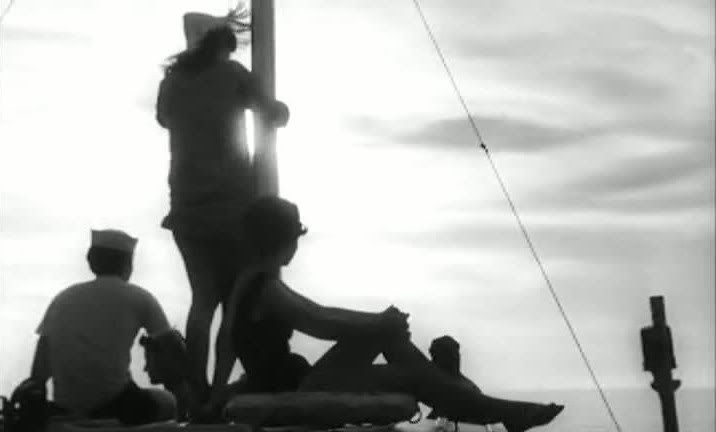
Adieu Philippine is a forgotten classic of the French New Wave, a marvelous, free-spirited film that hasn't received anywhere near the acclaim of the contemporaneous early offerings of the more famous New Wave filmmakers. It was the first film of Jacques Rozier, shot in 1960 and only finished in 1962 due to production difficulties. Though Rozier is far from a household name in comparison to the other New Wave directors — indeed, after this film failed he didn't make another feature for over ten years — this debut deserves to be mentioned along with Breathless and The 400 Blows as a remarkably assured and joyous first leap into filmmaking. It's a loose and improvisational film, shot like many of the other early New Wave films on the fly, in the streets and anywhere a camera could be quickly set up. Frequently, in the outdoor shots, passersby openly gape at the camera, stopping to stare, and Rozier mirrors this acknowledgment of the film's artifice in the metafictional, semi-documentary sequences that take place at a TV studio, where the film's central character Michel (Jean-Claude Aimini) works as a camera assistant. The film's credits roll, in staggering stop/start fashion, over a sequence set in the TV studio, where everyone is bustling around, rolling cameras frantically around the set, punching the sound in and out as they film a jazz combo performing. In the midst of this chaos, Michel fixes on a pair of cute girls gawking outside, Liliane (Yveline Céry) and Juliette (Stefania Sabatini), and invites them in to watch. Indeed, whenever the TV crew is filming, there are always people standing by and watching, and at one point Michel stumbles into a shot, walking across the frame of a melodramatic period costume drama, looking stupidly into the camera in his white t-shirt and jeans, an intruder from the modern era, from outside the narrative, like all the random people who Rozier's camera captures in the streets around his protagonists.
That loose sensibility winds through the film, giving it a jazzy, spirited vibe as Michel flirts with both girls, trying to decide who he wants more, as the girls, inseparable best friends, engage in a competition that's initially friendly and joking, but soon gives way to jealousy and hurt feelings. This love triangle drama, played lightly but with real feeling, plays out against the constant threat of the Algerian War: Michel knows that he will soon be summoned for the draft, and that promise of the future lingers over the entire film as an inescapable climax. The girls try to get him out of the draft, but their plans quickly peter out and Michel, for his part, seems fatalist about the whole thing, viewing his future service as an unavoidable destiny. With this fate hanging over him, Michel hangs out with his buddies, buys a car with them to pick up girls, plots to break into commercial filmmaking, and finally decides to go on vacation while waiting to be called up for the military.
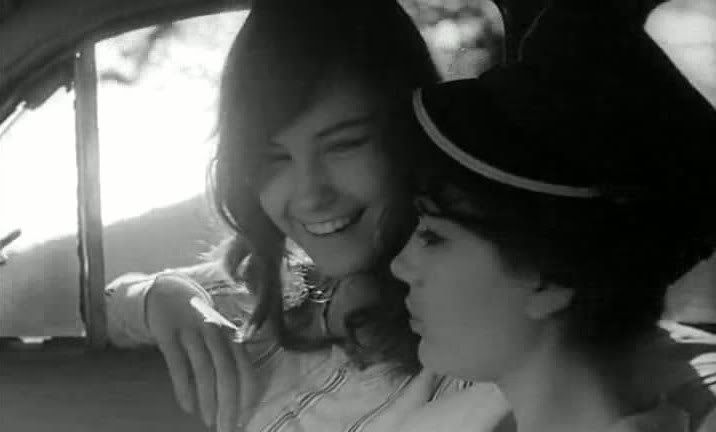
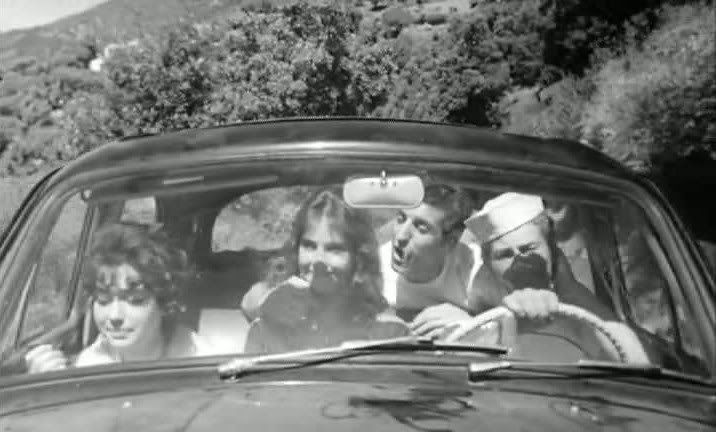
The film has a casual, episodic feel that befits its amateur shoot and its mostly inexperienced cast of non-actors, the bulk of whom never acted in another film before or after this one. It feels like a film of observation, of documentary, observing the life of this young military-age man in the months before he's sent to war. The film's joyful tone and light sensibility thus seem fragile, subject to shattering at any moment, and there's a current of mournfulness running through everything that happens, as though the film is simultaneously a celebration of and an elegy for the freedom and serenity of youth. The film's characters are young and innocent, and their flirtations and their dalliances are inflected with that innocence; Michel genuinely can't decide which girl he likes best, and indeed he seems to like them best together, while the girls try to tell themselves that they're not taking any of this too seriously, that it's all just a game. In any event, their friendship and their affairs seem to have an expiration date as Michel's impending enlistment approaches.
Nevertheless, Rozier keeps the tone predominantly airy and fun, with a strong thread of humor. Liliane's employer, the producer Pachala (Vittorio Caprioli), is especially humorous as a parody of the commercial aspects of the cinema — both literally, in the sense that he makes advertisements, and metaphorically as an icon of all the money-men and dishonest manipulators serving as middle-men in the film industry. Rozier had his own troubles with producers — Adieu Philippine languished unfinished for nearly two years due to conflicts over money, and only the intervention of Rozier's famous friend Godard could marshal the production support necessary to finish the film — and his mockery of Pachala is a hilarious, biting commentary on the intersections of art and commerce.
Pachala (played, perhaps not coincidentally, by one of the few professional performers in the cast, an Italian actor who worked with Rossellini and Fellini) fancies himself an artist, but in fact he just makes lousy commercials and rips off his collaborators, disappearing whenever he owes some money. A shoot for an arctic-themed refrigerator commercial with a flimsy igloo is a comedy of errors, reflecting Pachala's odd choices of details to get concerned with: he shrugs off the fact that there's a palm plant in the supposedly snowy set, but gets fixated on the store owner's refusal to remove his tie while posing as an Eskimo. Even better is the scene where he shows a detergent sponsor the rushes for another commercial the girls starred in, and there doesn't seem to be a usable take — one where the girls aren't giggling uncontrollably or knocking over detergent boxes — in the whole reel, as Pachala sinks lower and lower in his seat next to his corporate sponsor. Later, Pachala shows up again as a producer of "photo-romans," narrative sequences of still photos, with a sleazy interest in baring the breasts of his actresses and a corresponding disinterest in the niceties of historical recreation; he just shrugs it off when modern boats show up in the backgrounds of his photos of supposedly ancient subjects. He's a hilarious character, a target of rich mockery every time he shows up on screen.
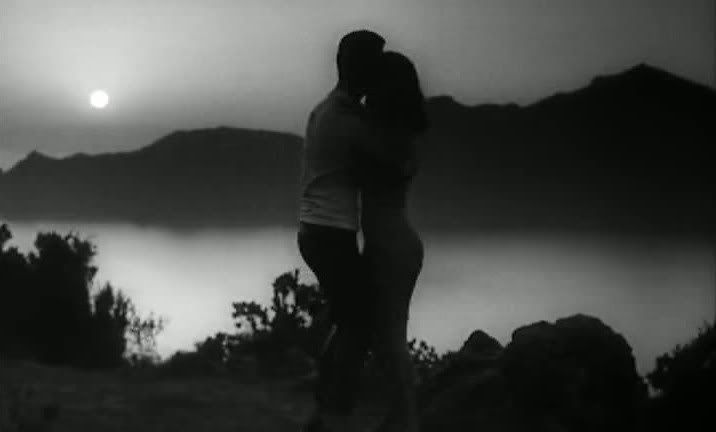
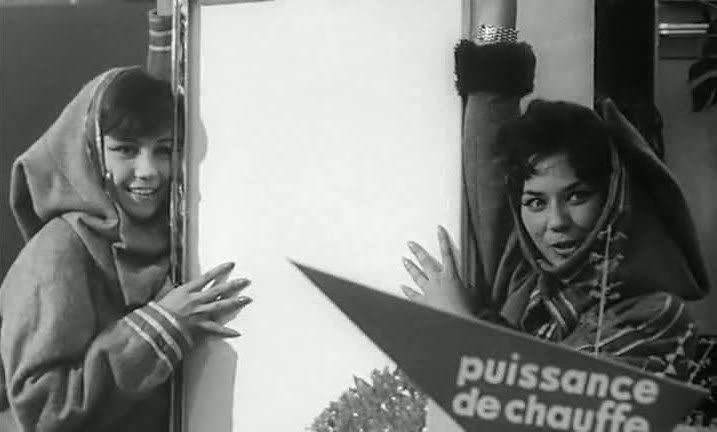
To some extent, Pachala's corrupt business practices and inconsistent mise en scène are contrasted against the joyful, of-the-moment attitudes of the young people — and against Rozier's own partially improvised, free-wheeling methods. Pachala represents the old ways, the tradition, the closed system of money and patronage in which young artisans like Michel and his friends are simply exploited and cheated. The film's tribute to the young is thus a tribute to the New Wave itself, in opposition to those vested interests, to the cheesy production values of the costume dramas that Michel works on or the silly commercials and trashy quasi-porn of Pachala. Adieu Philippine is something else altogether, like Breathless and The 400 Blows and the other early works of the New Wave, films with life and energy in every frame.
Rozier's images are at times sweepingly romantic, particularly when the central trio go away on vacation to Corsica — a last vacation, it seems, before adulthood and responsibility. There are so many great scenes here, so many wonderful moments, like the sequence where Liliane is serenaded by a hitchhiker and slow-dances with him, silhouetted against a foggy valley with the moon a distant glowing coin in the hazy night. There's also a meditative boat ride with the three principals filmed from behind, their faces towards the sun. More often, they're facing the camera, and their faces say a lot, even in the scenes where Rozier — who used primitive sound equipment and post-dubbed almost everything — omits the dialogue from the soundtrack. The faces of the girls, especially, are expressive and unforgettable, ranging from their giggly camaraderie and sly smiles of complicity to their moments of melancholy quiet and pensiveness. Everyone gives endearing amateur performances, witty and vibrant, and there's a sense of playfulness in all of the actors, as well as in the jagged camerawork and uneven sound, which mixes on-the-street verité with studio dubbing. The film has a real sense of physicality and corporeality, whether in the TV studio sequences of the first half or the seashore idyll of the second half, in which Rozier potently captures the feel of the sun and the ocean, the girls in their bikinis and one-pieces, the laughter and jealous rivalry during the car rides along scenic winding roads that crawl, serpent-like, towards no place in particular.
Still, throughout this scenic and spirited movie, a troubling scene from earlier lingers in the memory: one of Michel's friends has just returned from the army and from Algeria, and when Michel asks about it, the friend simply refuses to talk about it. It's just a single line, a momentary pause in the midst of the young man's joyous homecoming, but it reverberates with all the unspoken torment of the war, all the things that these characters are so intent not to address, to erase in pleasure and play. Politics enter the film explicitly only in a single scene in which Michel's family discuss technology, China and economics in a manner very familiar from any family's dinner table political discussions. It has that feel of real working class people glossing over these massive international topics with their rhetoric and their insistent if incompletely informed opinions. If the rest of the film never addresses politics explicitly, never discusses the Algerian War in any detail, the war and its effects on generations of young French men remain the subtext of nearly every scene. The war makes the characters' youthful games finite, sets an end date for their flings and their destination-free wanderings, and in that respect Adieu Philippine is about growing up into the world, about how the political affects even those who steadfastly ignore anything political, as these characters do. More than that, though, the film is about the joy of youth, about the joy of simply living. In its sensuality, its offhanded beauty, its extraction of the grace to be found in the quotidian, Adieu Philippine provides a more complete rejection of the ethos of war and death than any more explicit commentary could.

12 comments:
Ed, I love seeing that you're writing about this. I haven't tracked it down yet (it's never been very easy to find). But it's always mentioned among the crucial early New Wave works, some of which are still tough to find in the States -- a couple of Rozier films, and then things by Jean Rouch, Michel Deville, Jacques Becker, and Alexandre Astruc.
Thanks, Jeffrey, it's definitely worth seeking out. There's a nice set of Rozier's films out in France (with English subtitles) and I'm eager to check out some more of them now; if his later works are anywhere near as good as this then I really don't get why he isn't better known.
Delighted to see you're writing about this ultra-obscure classic. I first saw it in 1966 when someone at the Museum of Modern Art decided to program it. Totally overwhelmed by its lighter-than-air spirit, with a touch of sadness towards the end as the boy both girls love (without any sense of jealous competition) leaves to do his military serice in Algeria and they wave goodbye. They are of course wavimg goodbye to their own youth.
Years later the same gang that caught that showing (which included director Tim Hunter and screenwriter Terry Curtis Fox) turned up at another showing here in L.A. It was part of the L.A. film festival and was programmed by Alfonso Cuaron who cited Adieu Phillipine as a crucial inspiration for his teriffic Y Tu Mama Tambien.
Rozier has had a spotty career. When I was in france in the mid 80s' I saw his lovely Maine Ocean, a light comedy with very different characters but much of the same loose improvisatory technique of Adieu Phillipine.
The girls in Adieu Phillipine were also an inspriation to Jacques Rivette for Celine and Julie Go Boating
Ed, I saw David Ehrenstein last night at the Quad Cinemas during the 9:45 P.M. showing of THE MAKING OF THE BOYS IN THE BAND. Mind you I didn't see our friend in person, but rather he was featured in the documentary, briefly speaking about the period when the film was made, about one-fifth of the way into the film. I was shocked by teh revelations on Stanley Kauffmann, who has always been my favorite film scribe over the years. Crowley was present at a Q & A that followed the preceeding show.
Sorry for the diversion, I will get back on track with my next comment here.
"The film has a real sense of physicality and corporeality, whether in the TV studio sequences of the first half or the seashore idyll of the second half, in which Rozier potently captures the feel of the sun and the ocean, the girls in their bikinis and one-pieces, the laughter and jealous rivalry during the car rides along scenic winding roads that crawl, serpent-like, towards no place in particular."
Ed, you have me salivating over this one, which I've never seen, though have heard of. That remarkable comparison with BREATHLESS and THE 400 BLOWS as a maiden effort is telling enough, but your subsequent celebration of the film's bevy of buffo sequences further explores the exceeding excellence which reminds me of Mike Leigh in ways and Bresson in others. (episodic feel, amateur shoot, non-professional actors) And the exhilaration you speak of reminds me of Renoir's UNE PARTIE DE CAMPAGNE. You've really peeled off the layers of this film to produce yet another masterful essay that sits with your finest.
I REALLY must seek this out pronto. No lip service here.
I figured you for a fan of this one, David. I'm glad you mentioned the looong goodbye of the ending, a very moving sequence that really does make it seem like the girls are waving goodbye to their youth, to their innocence, and not just to the guy they spent the summer with. The ending just keeps going, with the girls running along the rock walls to keep the ship in view, as though they're reluctant to let go, to let Michel — and their youth — slip out of view. It's very touching.
Interesting connection to Celine and Julie, I can definitely see it. I know both Rivette and Rohmer praised the film when it first came out, and it's easy to see why. In various ways it complements both of their aesthetics, with its improvisation and emphasis on femininity (Michel becomes very much a secondary character in comparison to the girls) and its obvious affection for youth.
Sam, it's definitely one to seek out (and I bet Allan has seen it and/or has a copy). Of the names you cite, there's not the least trace of Bresson here, but Renoir and Leigh are pretty good reference points. Really, though, it's very much a New Wave film in every way, and as such it fits mostly comfortably beside the early works of Truffaut and Godard, as well as predicting in some ways the later films of Rohmer (the summery locales, the sensuality of youth, the deceptively light mood wrapped around deeper and more melancholy themes).
(And thanks for the info on the David sighting! Sounds cool.)
So glad Making the Boys is finally coming out. They shot me for it several years back.
Haven't seen Mart in quite awhile. He's a swell guy, and the film shows why. Especially interesting are the home movies shot at Roddy McDowell's beach house with Judy Garland and Rock Hudson present. It just doesn't get any gayer!
hello,
I just saw your post on Adieu Philipine.
My mother is Yveline Cery and she is always surprised how often this film is mentioned in discussions, festivals ect...so nice to see the appreciation for it, after all these years.
Regards,
Laurent
Laurent, thanks so much for checking in. It's an extraordinary film and your mother gave a wonderful performance in it, so much so that I was startled to see that she didn't go on to act more.
Bonjour,
Excuse delayed response.
She is looking to do some VO work in NYC/Boston area when not in France. Also may do a special screening sometime this year where she will discuss this little film once we track down rest of cast.
best,
Laurent
I did not see yet the movie, read a lot about it. Maybe a silly question: why is the titel Adieu Philippine?
Thanks in advanve for your answer.
Philippine
This is in response to the poster who was told untruths about Stanley Kauffmann. Stanley Kauffmann was a great champion and friend to the lgbt community. The slam against Kauffmann is absolutely false, a lie that's made the rounds through retelling by acolytes of the alcoholic Edward Albee. Kauffmann argued forcefully in the NYT that gay theater artists should have exactly the same rights as straight playwrights, including the right to have gay sex scene onstage. He was a great friend to to our community. Too bad people are still spreading lies about a champion to our community, beloved by lgbts including Susan Sontag, Martin Duberman, ERic Bentlely, among the most brilliant minds of the 20th century. Don't believe the lies. In his reviews he argued for transgendered kids to wear dresses or jeans, their preference to school, he championed the conccept of lgbt teachers being frank with their students about their lives as lgbt cintizens in this country, in theatre he is responsible, as the Village Voice reported from a writer who studied with Kauffmann, for hundred of lgbts jobs in theatre and film over the decades. Again, please do believe the lies spread by Edward Albee's acolytes who know the truth. Edward Albee even wrote a letter of congratulations after Kauffmann wrote his piece. Edward Albee got furious because he, and other critics, hated his new play, including lgbt critics. Albee, severely alcoholic, blamed Kauffmann for his loss of standing. He never apologized for his drunken, disgraceful behavior, nor have his acolytes. Just because someone is gay, it does not follow he tells the truth. I remember reading an article in The Advocate that charged Penelope Gilliatt with being a homophobe What a damnable lie. She wrote an essay supporting lgbt rights, including marriage and adoption in the 1950s in England. Her short stories included lgbt characters. She wrote the screenplay to Sunday Bloody Sunday, most of her best friends were gay, including playwright Joe Orton. But the Advocate called her homophobic.. Another disgraceful lie against a straight supporter. Don't believe Albee's acolytes. On their side, it's all a dirty melange of lying and character assassination.
Post a Comment